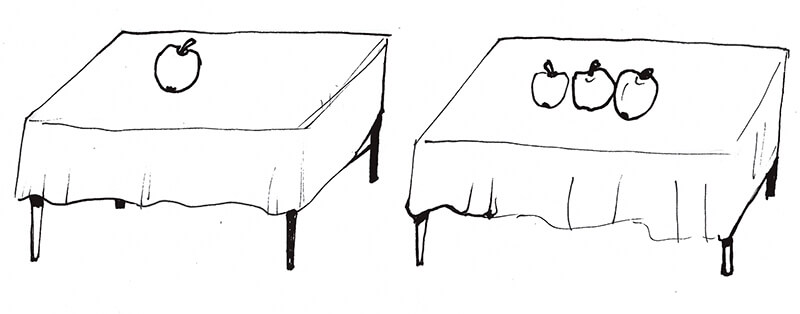There is - There are
In italiano le espessioni c’è - ci sono, sono tradotte in inglese con there is e there are
Waiter, there's a fly in my soup [tooltip]Cameriere c'è una mosca nella mia zuppa[/tooltip]

Come si forma there is / there are
L’uso di there is o there are dipende dal sostantivo che li segue direttamente.
Forma affermativa
si usa there is se il sostantivo è singolare
There is an apple on the table [tooltip]c'è una mela sul tavolo[/tooltip]
si usa there are se il sostantivo è plurale
There are some apples on the table [tooltip]ci sono delle mele sul tavolo[/tooltip]

La contrazione di there is è there's
There's a good song on the radio [tooltip]c'è una bella canzone alla radio[/tooltip]
there are non ha la forma contratta:
There are only five weeks until Christmas [tooltip]ci sono solo cinque settimane fino a Natale[/tooltip]
There're nine cats on the roof [wrong] [tooltip]ci sono nove gatti sul tetto (è sbagliato)[/tooltip]
Nell'inglese informale può capitarti di sentire la forma contratta di there's usata con i nomi plurali, ma è grammaticalmente sbagliata!
Forma negativa
La forma negativa si forma semplicemente aggiungendo not dopo is o are:
There is not a horse in the field [tooltip]non c'è un cavallo nel campo[/tooltip]
There are not two elephants in the zoo [tooltip]non ci sono due elefanti nello zoo[/tooltip]
Le contrazioni per le forme negative sono:
There's not = There isn't
There are not = There aren't
Forma interrogativa
La forma interrogativa si forma mettendo is / are davanti a there.
Is there a dog in the supermarket? - No, there isn't [tooltip]c'è un cane al supermercato? no, non c'è[/tooltip]
Are there any dogs in the park? - Yes, there are [tooltip]ci sono cani nel parco? sì, ci sono[/tooltip]
Come vedi negli esempi sopra nelle "short answers" si risponde ancora con there is / are
Tabella riassuntiva there is / there are
| There is | There are | Short answer |
| There is | C’e | There are | Ci sono | Yes there is / are |
| There’s | - |
| Is There? | C’è? | Are there? | Ci sono? | |
| There is not | Non c’è | Threre are not | Non ci sono | No there isn’t / aren’t |
| Isn’t there? | Non c’è? | Aren’t there? | Non ci sono? |
There are con any
Quando in inglese vogliamo indicare zero di una quantità (di qualcosa che esiste) usiamo there aren't any:
There aren't any trees in my street [tooltip]non ci sono alberi nella mia strada[/tooltip].
There aren't any people at the party [tooltip]non ci sono persone alla festa[/tooltip]

Si può usare questa struttura anche con gli uncountable nouns [che tratteremo più avanti durante il corso]
There isn't any water in the swimming pool [tooltip]non c'è acqua nella piscina[/tooltip]
There isn't any sugar in my coffee [tooltip]non c'è lo zucchero nel mio caffè[/tooltip]
How many con are there
se vogliamo sapere "quanti" oggetti usiamo How many seguita da questa costruzione:
How many + plural noun + are there (+ complement)
How many cars are there in your garage? [tooltip]quante auto ci sono nel vostro garage?[/tooltip]
How many cats are there in the park? [tooltip]quanti gatti ci sono nel parco?[/tooltip]

There is / there are con altri tempi verbali
Possiamo usare there is o there are anche con altri tempi verbali di to be
Simple Past
there was/were - there was/were not - was/were there…?
There was a good song on the radio last night [tooltip]c'era una bella canzone alla radio ieri sera[/tooltip]
Present Perfect
there have/has been - there have/has not been - have/Has there been?
There has been a storm here [tooltip]c'è stata una tempesta qui[/tooltip]
Futuro
there will be - there will not be (there won't be) - will there be…?
There will be a lot of people at Pink Floyd's concert tomorrow [tooltip]ci saranno molte persone al concerto dei Pink Floyd domani[/tooltip]
--- Per approfondire l’argomento ---
Contractions are possible, but they are mostly used informally in speech. (There's a fly in my soup).Other forms of "be" can also be used with there is/there are. ( There will be a party at Bill's house on Saturday - There were four witnesses at the crime scene). Since the expression there is/are usually has no equivalent in other languages, students sometimes use have instead.
| Have a lot of food on the table. It has a lot of food on the table. There have a lot of food on the table. There is a lot of food on the table. | (Incorrect) (Incorrect) (Incorrect) (Correct) |